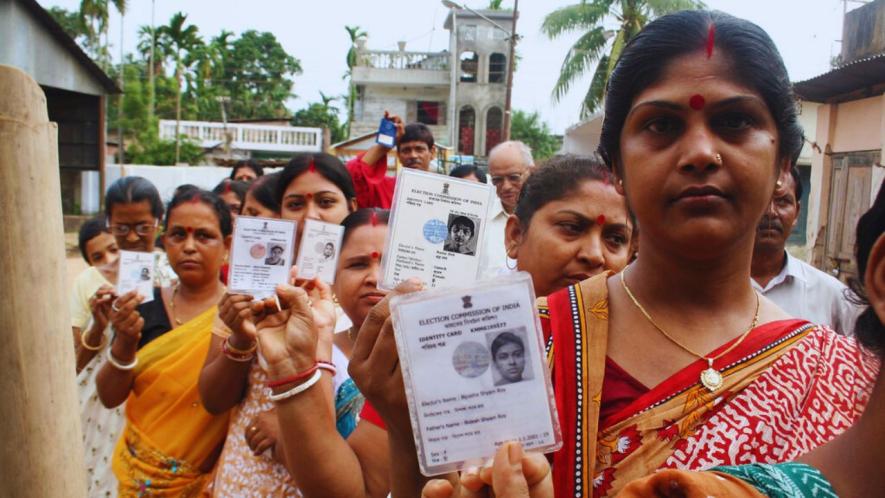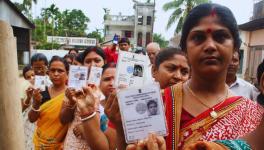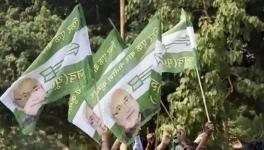Democracy For The Few?

Representational Image. Image Courtesy: Flickr
India pledged to usher in a democracy with universal adult franchise.
It was the late 1940s, when India, a newly independent nation, whose less than 10% population was then literate, embarked on this unique experiment, unheard of in those times.
The architects of Independence rejected all the Western prescriptions that openly said that .'.. India had no democratic future' (Winston Churchill) or ''monarchial arrangement best suited the Asian people' (British Prime Minister Clement Attlee to Nehru, 1949), and (to quote a student of history) 'met the imperial argument on direct terms, firmly believing in the possibility of creating democratic citizens through democratic politics.' (India’s Founding Moment: The Constitution of a Most Surprising Democracy by Madhav Khosla)
What is worth emphasising is that all those great leaders who shaped a forward-looking Constitution were on the same page when it came to granting the right to vote. For example, B.R Ambedkar, who was chairman of the Drafting Committee of the Constitution, firmly believed that 'To limit the franchise, was to misunderstand the meaning of democracy ... '
None of them dithered over this provision despite knowing well that even the Western countries had not fully adopted universal adult franchise. Remember, Switzerland granted the right to vote to women only in 1971.
Much water has flown down the Ganges, the Jhelum, the Brahmaputra, the Godavari or the Kaveri.
A good 75 years after the adoption of the Constitution (1950), today we are faced with a challenge that at first looks unbelievable, the present ruling dispensation seems to have embarked on a journey in an exactly reverse direction.
The architects of Independence had committed themselves to inclusion, so that the last wo/man on the street, participates fully in the nation-building process, develops stakes in this gargantuan exercise, whereas the emphasis of the present rulers seems to be on exclusion. Disallow people from even simple right to vote -- who have voted in elections for decades -- on a simple pretext that they do not have a piece of paper of identity, like a Class 10 certificate or birth certificates of their parents and declare them 'non-citizens'. Impose the onerous task of proving that they are Indians on the citizens themselves.
This is the only message that can be drawn from the sudden announcement by the Election Commission of India (ECI) that it would undertake a Special Intensive Revision (SIR) of the voters of Bihar -- an exercise unheard of in the ECI's history -- when it already finished the summary revision of the electoral rolls, a routine procedure by January 2025 and had already prepared the final electoral roll which, according to analysts, will lead effectively to disenfranchise “around 2 to 3 crore bonafide citizens of Bihar.”
The way the whole plan unfolded before the people made it crystal clear that it was a completely arbitrary decision that lacked transparency and practicality. The ECI did not even bother to take into confidence the Opposition parties, the key stakeholders in the whole process.
The question arises as to who suddenly decided this massive SIR close on the heels of the Assembly elections in Bihar, when all the preparations for it were already over?
How is it that the ECI, which is basically an enabling institution that facilitates voting rights of people, is suddenly given the mandate of deciding their citizenship as well, which is the Home Ministry’s job?
There are allegations that this exercise is nothing but backdoor implementation of the NRC - National Register of Citizens -- a much controversial exercise being done in Assam.
A state that already suffers from tremendous shortage of government staff in various departments, where four lakh posts are already lying vacant, when there has been no recruitment since the past two decades, the already burdened block level staff has been tasked to complete the exercise in less than a month.
As mandated by ECI, the around 8 crore citizens of Bihar will have to submit their forms with a fresh photograph and have been asked to submit either of the listed 11 documents to prove that they are bonafide citizens of the state, completely discounting the fact that a large section of the poor and illiterate people do not have any document either to tell their birthdates or their parents place of birth and date or any other paper.
The arbitrary nature of this decision can also be gauged from the fact that the ECI has declared that Aadhar card, which most of the citizens hold, or ration card or labour card cannot be used as proof of identity while submitting the documents.
It is crystal clear that this process is not about enabling citizens to join the process of electing their rulers as smoothly as it has been done till date, but putting the onus of proving citizenship on only them.
The elitist and highly casteist nature of these proposals can also be gleaned from the fact that
- One of the documents which would be valid for filling these fresh forms would be a passport. No doubt only a miniscule percentage of Bihar's residents (2.4 %) hold a passport and a significant section of them belong to upper castes
- Two, this is the season when half of Bihar is flooded and communication itself is a big problem, how can the block level staff visit the houses of the 8 crore valid voters from Bihar twice to confirm that they exist?
- Three, all studies show that there is unusually large-scale migration from Bihar for employment.
As per Census 2011 data, there were an estimated 7.45 million migrants from Bihar across various states and Union territories. This represents 7.2% of Bihar's population at the time. A significant portion of these migrants, 22.65 lakh (30%), cited employment as the primary reason for their migration.
How can all these migrants suddenly return to Bihar just to fill the form, complete other formalities, leaving their temporary jobs suddenly?
As explained by knowledgeable people, the earlier massive exercise of revision of the electoral roll was undertaken in 2003 and had taken around a year for the Election Commission to finish.
This sudden move, aptly being termed as 'votebandi', has created a tremendous wave of anger among Opposition parties, civil society organisations and concerned citizens, who have resolved to undertake a peaceful mass movement so that this 'Tughlaqi firman' is quashed.
Looking at the fact that Bihar is a very poor state with a large section of population cosisting of marginalised communities, trying to somehow make ends meet by working in the state or elsewhere, the biggest brunt of this SIR will be faced by only them.
A majority of the people, whose names will be deleted, will be from the Scheduled Castes, Scheduled Tribes or people from religious minorities, especially Muslims, and poor from various categories, who will find it next to impossible to fulfill the requirements set by the ECI.
Unless and until this exercise is scrapped completely and elections to the Bihar Assembly are held on the already prepared electoral rolls in January 2025, lakhs of valid voters would not only be deleted from the voters list but will have to make strenuous efforts to prove that they are citizens of this country, despite the fact that generations of them have lived in Bihar or worked as migrant labourers in parts of India.
Petitions have been filed in the highest courts challenging the decision and demanding Supreme Court's intervention in stalling this process which would “disenchfranchise millions of citizens.”
The latest revelation by Reporters’ Collective. which has undertaken an investigation into the whole issue, brings to the fore many shocking details of the exercise and adds further opacity to the decision. [https://www.reporters-collective.in/trc/bihar-electoral-roll-investigation]
Titled 'The Disputed 7,80,22,933* Voters of Bihar' (* from the electoral roll finalised in 2025), it tells us that how records clearly reveal:
[A] detailed review and updation of the Bihar state electoral roll was completed by January 2025. The roll was found to be robust. Officials were updating the roll well into June. Suddenly, the Election Commission of India called it faulty and junked it, ordering an unprecedented exercise to verify voters from scratch. Chaos has ensued.’
It begins with a story of one Tabrej Alam from Meghua village in East Champaran district of Bihar, who had submitted a form to the designated booth-level officer to delete Hussain Sheikh’s name from the electoral roll as Hussain had passed away. [On June 11, 2024] and how by November, election commission officials verified Tabrej’s identity and his claim and by January 2025, deleted Hussain’s name from the voter list of Bihar.
According to the story, “now five months later, the same 37-year-old Tabrej was forced by the Election Commission of India to prove with documentary evidence that he exists, is a citizen of India and resides regularly enough in his village to have the right to vote in the upcoming Bihar assembly elections.”
Anybody can see that with this 'Tughlaqi firman' of ECI, how there are millions of citizens in Bihar, like Tabrej, who may have voted in one or all of the last five general elections and five Assembly elections, but now have to present documentary evidence rather quickly to validate their right to vote. And, if they are unable to, they could stand as people of doubtful citizenship in the eyes of the law.
Bihar, termed as the 'land of world's first democracy' will henceforth be remembered a test case of disenfranchising people and ushering in ‘Democracy for the Few’, an elite democracy.
People know well that this move will not remain limited to Bihar, it will be extended to the rest of India and would look like a very valid exercise from outside, but would enable the ECI to weed out citizens from the list arbitrarily and turn them into non-citizens on simple pretexts.
The silence of the ruling dispensation over this exercise is telling because this once again vindicates the Opposition charge that instead of a neutral body, the ECI, a highly respected autonomous body in India, has no qualms today in acting to benefit the ruling dispensation.
Since the past over a decade, we are conversant with the allegations by the Opposition about how various institutions of democracy, such as the ED, CBI, are getting further compromised and weaponised, right before our eyes, or the defanging of watchdog institutions, such as the Comptroller and Auditor General of India or CAG, already under scanner. The increasing assault on the independence of the press and judiciary is has also become a cause of concern. But, of late, the growing possibility of vitiating the electoral process is increasingly being noted.
While the issue of the controversial electoral bonds-- ruled as illegal by the Supreme Court, which provided tremendous benefit to the coffers of the ruling dispensation before the elections to Parliament -- dogged the headlines prior to the elections to Parliament, since last few years, the Central Election Commissioner’s claim of impartiality has been debunked again and again. The way it played in settling intra-party disputes have also been challenged at various levels.
Till date the questions raised by the Opposition in Maharashtra regarding elections to the Legislative Assembly remained unanswered, leading to valid concerns being raised about 'match fixing' of sorts at the highest level.
“Voter rolls and CCTV footage are tools to be used to strengthen democracy, not ornaments to be locked up. The people of India have a right to be assured that no records have been or will be trashed”, wrote Congress leader Rahul Gandhi. He accused the ECI of "deleting evidence" when it was required to "provide answers" after the poll body instructed its officers to destroy CCTV, webcasting and video footage of the elections after 45 days.
Bihar, the ‘land of world’s first democracy’ also happens to be land of mass movements against unjust policies of the government since the days of anti-colonial struggles and it is sure that masses of Bihar will not take this ‘slow demise of democracy’ or its being turned into a ‘Democracy for the Few’ lying down.
Undoubtedly, the people will unite against this sinister move by the rulers to declare them doubtful citizens proving that they have learned lessons from the architects of Independence thoroughly, and are their true legatees.
The writer is a veteran independent journalist. The views are personal.
Get the latest reports & analysis with people's perspective on Protests, movements & deep analytical videos, discussions of the current affairs in your Telegram app. Subscribe to NewsClick's Telegram channel & get Real-Time updates on stories, as they get published on our website.
























